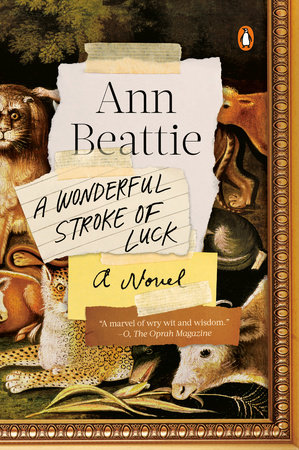interviews
Ann Beattie’s “A Wonderful Stroke of Luck” Is a Character Study of Generation Y
The author on symbolism and art

Who needs an introduction to Ann Beattie? The writer is an icon. Since the 1970s she has been publishing stories and novels we’ve marveled at, for their wit, intelligence, and their wry, affectless treatment of contemporary people navigating the messes of their contemporary lives. When I mentioned to a friend I was interviewing her for Electric Lit, my friend swooned. “Have you read Chilly Scenes of Winter? Chilly Scenes of Winter is amazing. I love Chilly Scenes of Winter.”
That classic novella was published in 1976, years before my friend and I were born, but since then Beattie’s place in the American canon has been firmly established. Which has not protected her, by the way, from bad reviews. In 1998 she was accused in the New York Times of “irritating moral passivity” (the sort of a accusation that reveals more, I think, about the critic than it does about the fiction writer). In 2011 Beattie’s novel Mrs. Nixon: A Novelist Imagines a Life was widely declaimed for its meandering storyline and its bravado.
Beattie’s newest novel A Wonderful Stroke of Luck feels somewhat plotless, too, but I found its twists and shadows full of secrets and surprises (so to speak). What makes Beattie’s work so interesting, to me, is its resistance to conventional, formal narrative structure. Its artistry is in its wit and its humanity, its remarkable formal verisimilitude.
In 1983 Beattie was quoted in an unpublished interview for the Paris Review as saying, “I can’t help it if people make the mistake of thinking that I am a prophet and that I am disguising my wisdom as short fiction that’s published in The New Yorker.” Reading this book I kept thinking, What does it say about me, as a reader, that I am searching for hidden meaning in this narrative?
A Wonderful Stroke of Luck is best described, I think, as a novel-length character study. The narrative chiefly follows its protagonist Ben, from his late teenage years in the late 1990s at the fictional boarding school Bailey Academy (“that fancy school where everybody played to everybody else, so you came out thinking the whole world wanted to be your audience”) through his mid-30s in a New York exurb (“life on the lam as a reverse-snobbery style statement”). The voice is talky, funny, omniscient, and inconsistent. It dips in and out of different characters’ points of view in a jazzy, virtuosic free indirect discourse, occasionally informing us of things they cannot know. Every character, however tertiary, has his own thoughts, sense of humor, manner of speech, and opinions, “his own constant personal debate.” The story of Ben’s life is thus interrupted—often, incidentally, and delightfully—by brief, sharply observed forays into the lives of the characters around him, among them many of his boarding school cohort, his stepmother, his sister, his on-again-off-again girlfriend, his eventual neighbors, and—most oppressively—his teacher Pierre LaVerdere, who heads up the Bailey Academy honors society, LaVerdere’s Leading Lights, and who remains a (sometimes unwelcome) touchstone well into Ben’s adult life. A Wonderful Stroke Of Luck left me feeling as if I’d expanded my circle of real life acquaintances.
Especially because, coincidentally, their circumstances are familiar to me. I myself am just one year older than Beattie’s fictional characters. LaVerdere’s protégés are high school seniors when the planes hit the World Trade Center on 9/11. That day, I was in my first week of college, fresh out of a small private school as self-consciously liberal and intellectually dizzying as Bailey. So it was rather an out-of-body experience for me to read this wry, rambling account of the coming-of-age of my own microgeneration. I found myself frequently startled by the accuracy, perceptiveness, specificity, and humor of Beattie’s observations. I looked forward not just professionally, but personally, to asking her all about it.
Rachel Lyon: LaVerdere’s Leading Lights strikes me as a kind of alternate universe Dead Poets Society, Pierre LaVerdere playing the dark twin of Robin Williams’s character in the film. Where Williams’s John Keating is earnest, honest, inspiring, and dedicated to waking up his handsome young students, Pierre LaVerdere is perverse, opportunistic, given to prevarication, solipsistic yet bored by himself, often disappointing—and disappointed in them. When he admits he attempted and failed to write a book—a “humbling experience” (“I really did assume I had a book in me,” he says, “but then I thought: Why think in those terms? …What’s so great about an imaginary, internal book?”)
I found myself dying to know: what does Ann Beattie think of LaVerdere?
Ann Beattie: I love that description of him as the dark twin. I think LaVerdere remains something of an enigma, though as you observe him through time, you get more information. The LaVerdere we first meet is really Ben’s LaVerdere – and Ben has something invested in how he thinks of him. Ben has a limited point of view, as well as his own limited perceptions. He’s young, defended, conflicted, and–no different than his teacher–he projects. I should also say that I cringed when LaVerdere made his spur-of-the-moment visit to Ben, because I really didn’t know what would happen.
RL: Your scenes of LaVerdere’s heady classroom discussions, in the months and years just before 9/11 reflect a degree of creative and philosophical freedom that I feel I remember, and that in retrospect seems luxurious, even indulgent. As the novel goes on, however, we watch Ben and his peers come of age in a country that took a hard right in the ensuing years. They struggle to outgrow their education, attempting to unlearn what they were taught at Bailey. (“All those years in the debate club, along with all the years afterward trying to forget what he’d learned so he could talk like a human being again.”) We watch Ben grow up, intellectually, before our eyes:
Metaphor. It was insidious. You had to ignore that way of thinking, the same way you had to understand that your dreams contained straw men rather than real omens, the way you were obliged to admit your neurotic fears lacked legitimacy. Strangely, to admit you lacked intuition, that you realized symbolic stories were inert, that you had no special abilities, no second senses to go on, meant that you had achieved a sense of power.
The book engages, as Ben does, in a sort of relentless breaking down of abstraction. When Ben finds himself still in possession of his friend’s father’s beret, which has held some significance for him over the years, he finds that naming it—referring to it first as a souvenir and then, “more bluntly,” as just a hat—renders it powerless. LaVerdere is demoted in the course of a paragraph from the devil himself to “a sad approximation, a devil in a diorama,” Ben’s high school crush from “an enigma” to “only hard, hard and self-protective.” You write, “Men’s actions had little to do with language and metaphor, and everything to do with testosterone and cortisol.”
Tell me about the power to be found in resisting metaphor and symbolism.
All literary devices that writers invoke effectively can be hugely revealing, at the same time they also add another layer of veneer.
AB:That’s a complex question that seems to ask more than just what I feel about a couple of literary devices! I appreciate your reading the book so closely and for seeing that one of the questions of the book is about power. Flannery O’Connor says (I agree), that symbolism isn’t something you superimpose, though I think what it’s an outgrowth of–-whether, say, we’re talking about a plant shallowly rooted (descriptive; not a value judgment), or one with a long taproot–-is important to consider.
Let me try another answer: The narrative voice adheres closely, here, to Ben’s thoughts – that’s how the reader learns what Ben has concluded. I think that word “concluded” is important because these statements are obviously not where the book concludes. In every case, with or without such revelations, Ben goes right on. I hope there’s something visceral and also painful about such sweeping assertions as the ones you point out — that they’re emphatic enough to get the reader’s attention, but that they also make the reader ask, “Really?” I can’t help noticing that with these declarations, Ben’s like LaVerdere in his cynicism and his way of seeming to have everything figured out. Last response: all literary devices that writers invoke effectively can be hugely revealing, at the same time they also add another layer of veneer.
RL: The painting The Peaceable Kingdom appears and reappears in the book—on its cover, of course, and in its pages too. In one oblique reference, the painting is unconsciously channelled by a character whose mother, an eccentric zookeeper, used to dress in animal costumes: “She sat at the kitchen table and verbalized the animals’ thoughts into a Dictaphone, using a variety of voices. She believed she could read their minds.” What attracted you to this painting, and how do you understand its role in the book?
AB: I didn’t know what the cover would be. I wanted to conjure up a painting familiar enough that many readers would immediately have a sense of it (perhaps I should have caved and used Jeff Koons?) – and also, something LaVerdere would really be pained to have to talk about. That short chapter speaks to a serious concern in the novel, but it’s also played for laughs. My husband’s a painter, so we enjoyed poking fun of such ridiculous talk about art. Also, in general, I tried to get a vibration going in the novel between the natural world (I have to agree with LaVerdere: this painting’s idealized–-though that’s hardly the point), and the lives we’ve constructed as we live apart from nature, which is a concern of Ben’s when he leaves the city. That dichotomy’s everywhere in the book.
RL: Ben makes a useful protagonist because he’s a natural observer; in fact, he seems to experience himself almost exclusively through his observations of the people around him. When he’s feeling uncomfortably vulnerable in a strange rendezvous-a-trois with his confrontational girlfriend and humorless sister, his attention turns to a child nearby, “a little boy in his overalls, bib and forearms streaked with ketchup.” Avoiding his feelings after an upsetting encounter with an ex, he wanders a CVS and witnesses a young woman shoplifting a bag of candy. Indeed he only recognizes his own anxiety when he reads about it in a magazine:
How strange that it took him some time to figure out that he was experiencing claustrophobia. …He read with interest pieces in New York magazine about people his age, or just a bit older, who’d decided to set up camp outside New York City. He admitted… that he felt restless, as if he’d been captured. Saying that word had surprised him, because it was the first time he’d put a name on his anxiety.
How would you characterize Ben, and the way he changes over the course of the book? Does his transformation reflect, in your mind, a broader, post-9/11, intellectual and emotional shift, among the privileged population he belongs to?
AB: He’s a natural observer, but there’s only so much you can learn by observation. Maybe he overly relies on this navigational tool. What exists apart from his vision-–apart from his knowing–-turns out to be crucial information.
RL: The title of the book is contextualized by its epigraph, from the Dalai Lama: “Remember that sometimes not getting what you want is a wonderful stroke of luck.” I puzzled over this for a while, because Ben seems neither to want anything very badly, on a conscious level, nor to be particularly “lucky,” whatever that means.
But in maybe my favorite passage, adult Ben thinks of LaVerdere after reading an essay by Flannery O’Connor:
It was one LaVerdere had particularly admired (for a long time, Ben had thought Flannery O’Connor was a man)—something to the effect that when writers succeed, it’s because their conscious mind, alone, hasn’t been the most significant factor. To the extent that LaVerdere could be called mystical (he wouldn’t have liked that word), he did seem to believe, as O’Connor did, that there were enormous realms—pre-existing realms, like as-yet-unseen galaxies—that contextualized for you. That was why writers were so often quoted as being paradoxically relieved to be surprised.
I am guessing this refers to O’Connor’s essay “The Nature and Aim of Fiction,” is that right? (Which, incidentally, opens with her remark—thematically relevant here!—that hearing different writers’ opine on the craft of writing is something like “having the zoo come to you, one animal at a time; and I suspect that what you hear one week from the giraffe is contradicted the next week by the baboon.”) I wonder if you see a connection between the epigraph and the passage above, something about the unknowability of the self. What is the value—comedic, creative, or otherwise—in not understanding ourselves—for fictional characters and for the writers who create them?
AB:I’ve read Mystery and Manners many times, though I didn’t remember that. It’s just wonderful. As in: a wonderful stroke of luck that animals figure explicitly in my novel – though I can’t pretend I was alluding to that.
Yes, I had in mind “The Nature and Aim of Fiction,” including, “The longer you look at one object, the more of the world you see in it, and it’s well to remember that the serious fiction writer always writes about the whole world, no matter how limited his particular scene.” LaVerdere also speaks loosely, though. Among many other things, he’s a bullshitter – so what he says often has different layers of meaning.
In partial answer to the last part of your question, let me recommend Missing Out, by the psychoanalyst Adam Phillips: “we can’t imagine our lives without the unlived lives they contain. We have an abiding sense, however obscure and obscured, that the lives we do lead are informed by the lives that escape us.” My friend Susan Wood asked me to go with her to hear Adam Phillips talk with Paul Holdengraber years ago at the Miami Book Fair, and he was brilliant, I was riveted, but only now have I finished this fascinating book.









